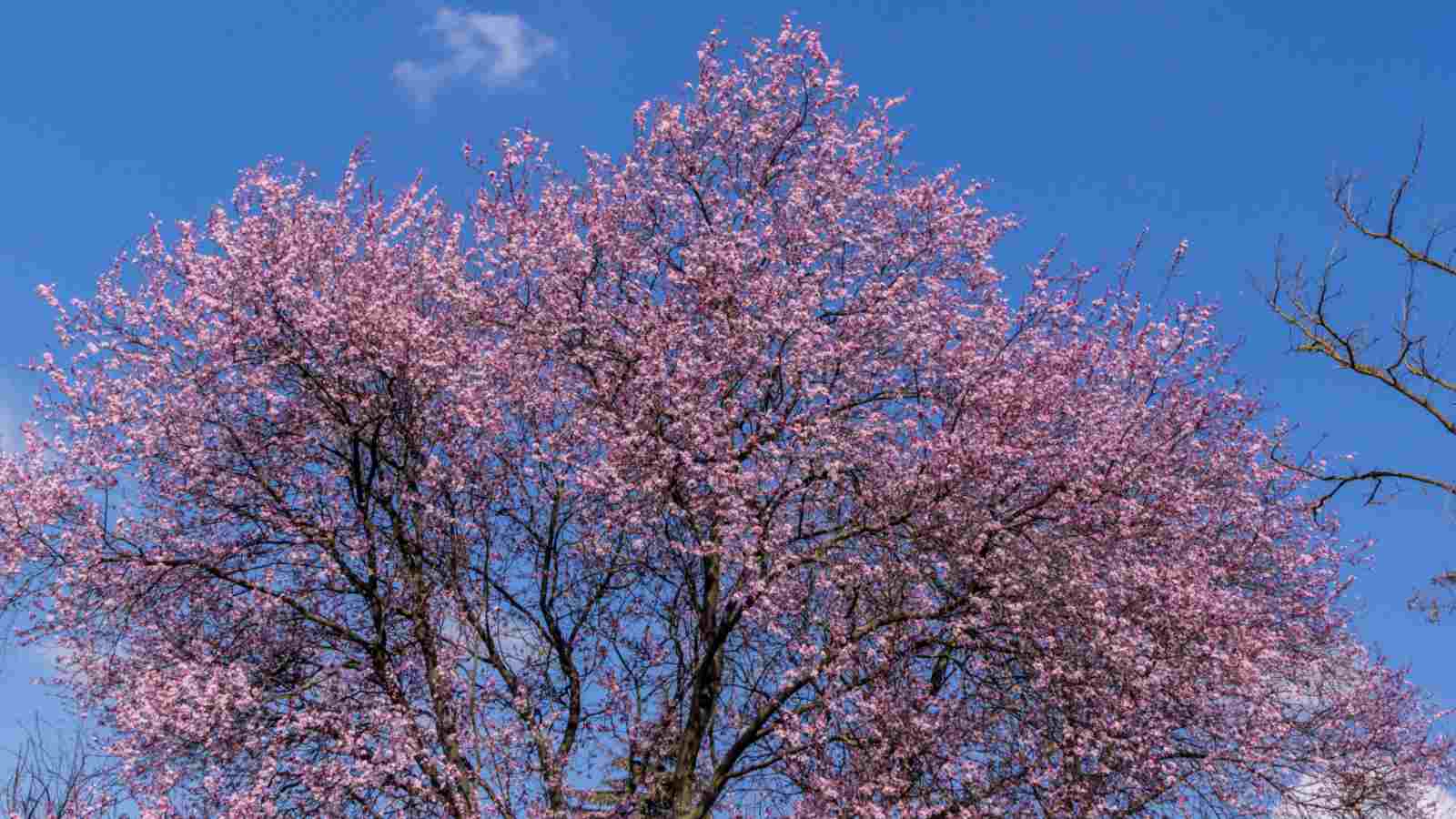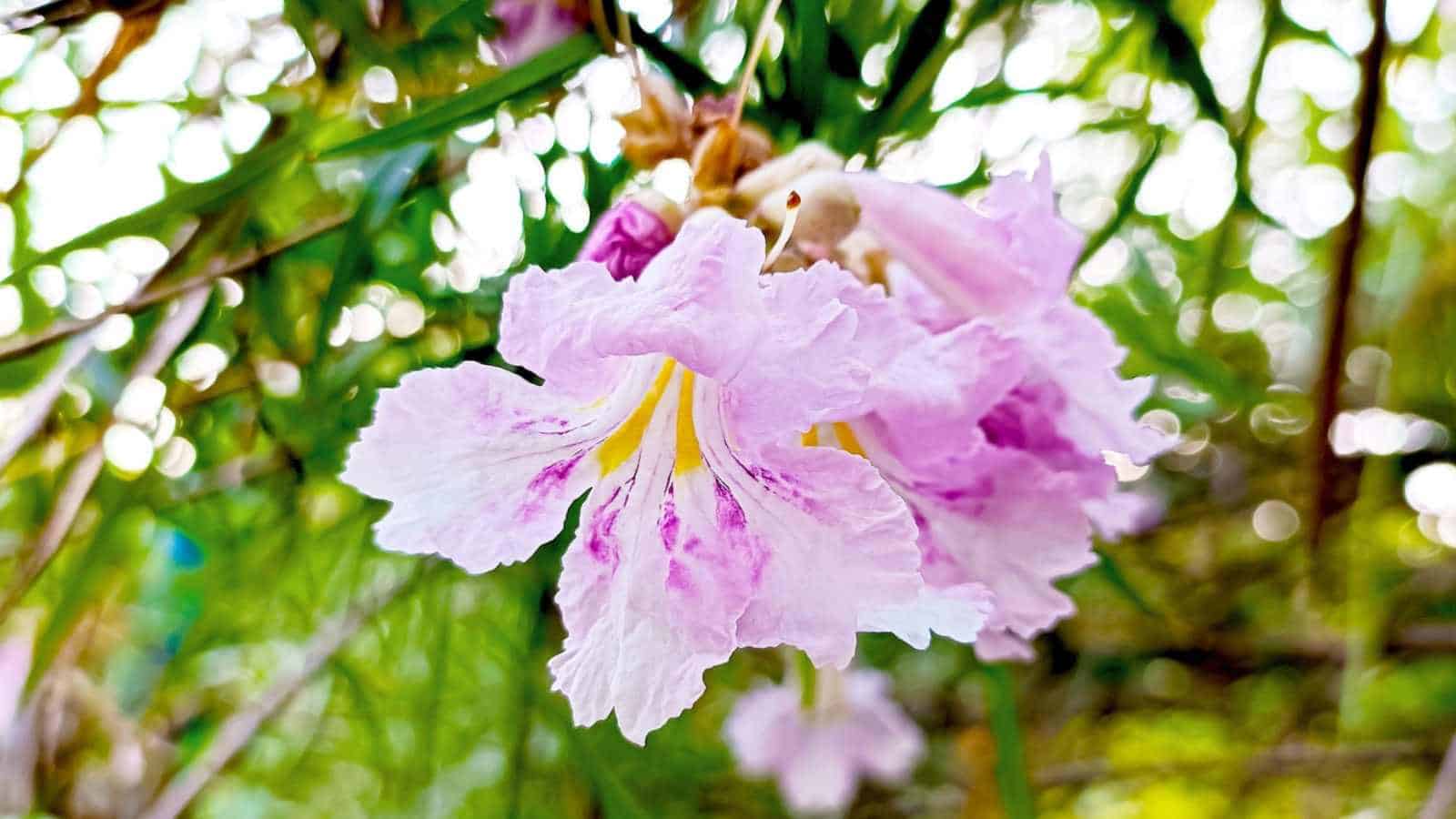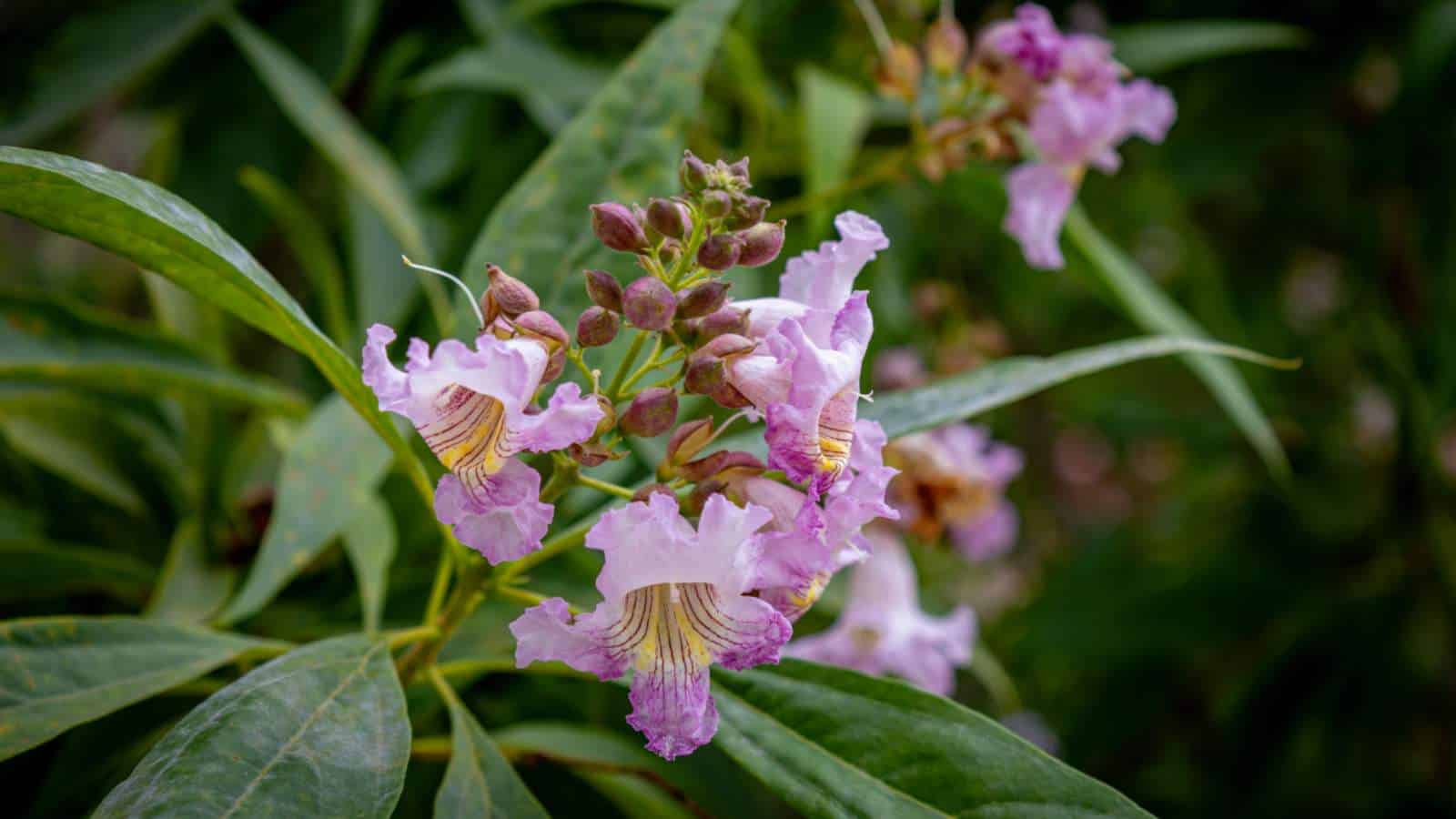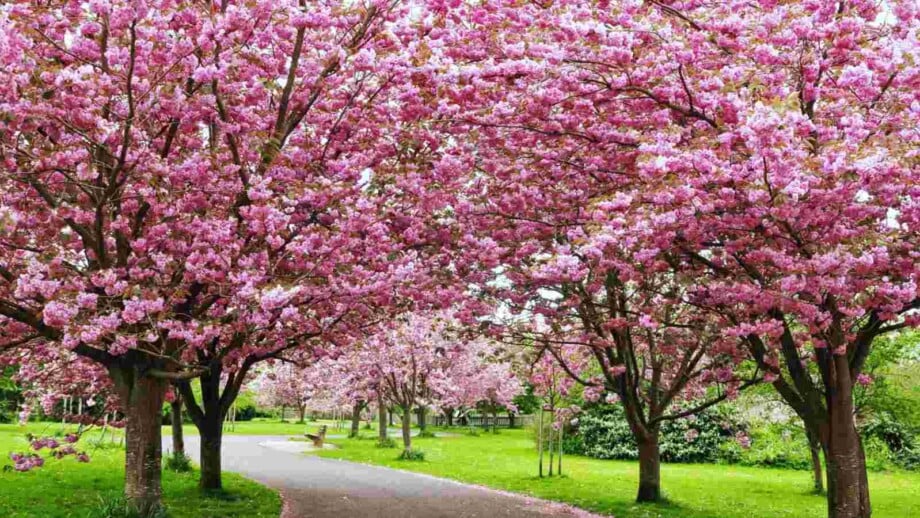When it comes to transforming your garden into a vibrant paradise, few things can rival the elegance and charm of pink flowering trees. Picture this: your yard, adorned with delicate pink blossoms, each petal whispering tales of nature’s beauty. In this article, we will explore the wonders of 40 pink flowering trees, each a unique masterpiece waiting to grace your yard.
Pink flowering trees are nature’s way of gifting us with living poetry. They come in various shades, from the subtle blush of dawn to the vivid hues of twilight. Imagine waking up to the sight of your garden bathed in the soft, rosy glow of a Pink Dogwood or the regal aura of a Kwanzan Cherry. These trees don’t just bloom; they dance in the wind, creating a mesmerizing spectacle that captivates the heart.
The world of pink flowering trees is as diverse as the colors in a painter’s palette. From the iconic Cherry Blossoms painting landscapes in Japan to the exotic Magnolia Jane gracing gardens in the United States, these trees bring a touch of magic wherever they grow. Some, like the Yoshino Cherry, boast fragile, pale pink petals, while others, such as the Southern Magnolia, flaunt sturdy, creamy blooms. They hail from various corners of the globe, from the Cherry Blossoms adorning the Tidal Basin in Washington, D.C., to the Jane Magnolias embellishing gardens in Europe.
Pink flowering trees aren’t just eye candy; they offer a plethora of practical uses too. Some, like the Pink Trumpet Tree, attract pollinators, transforming your garden into a haven for butterflies and bees. Others, such as the Pink Dogwood, provide shade and shelter for birds, making your yard a lively ecosystem. In addition, many of these trees yield fruits, like the Gala Apple Tree, promising a delectable harvest alongside their ornamental value.
Creating a thriving garden filled with these pink wonders requires a bit of know-how. Planting them in well-draining soil and providing adequate sunlight ensures their healthy growth. Regular pruning not only maintains their shape but also encourages more prolific blooms. Like nurturing a delicate friendship, understanding their specific needs and quirks is the key to a flourishing relationship with these floral companions.
Here are 40 best pink flowering trees that you can choose for your yard:
Magnolia (Magnolia spp.)

- Botanical Name: Magnolia spp.
- USDA Hardiness Zones: Varies by species (typically 4-9)
- Light: Full sun to partial shade
- Soil Needs: Well-draining soil, varies by species
- Mature Size: Varies by species
- Deer Resistant: Yes
Magnolia trees offer large, fragrant pink flowers that add a touch of elegance to any landscape. Choose a magnolia species that suits your climate zone. These trees appreciate well-draining soil and a sunny location. Regular pruning and mulching can help maintain their health and beauty.
Weeping Cherry Tree (Prunus pendula)

- Botanical Name: Prunus pendula
- USDA Hardiness Zones: 5-8
- Light: Full sun
- Soil Needs: Well-draining, slightly acidic soil
- Mature Size: 15-25 feet tall
- Deer Resistant: Yes
Weeping Cherry trees cascade with graceful, pink blooms, creating a stunning focal point in gardens. These trees require full sun and well-draining soil. Mulch around the base to retain moisture and protect shallow roots. Pruning is essential to maintain their weeping form and encourage abundant flowering.
Saucer Magnolia (Magnolia × soulangeana)

- Botanical Name: Magnolia × soulangeana
- USDA Hardiness Zones: 4-9
- Light: Full sun to partial shade
- Soil Needs: Well-draining, rich soil
- Mature Size: 20-30 feet tall
- Deer Resistant: Yes
Saucer Magnolias, also known as Tulip Magnolias, boast large, cup-shaped pink flowers with a hint of purple. These trees prefer rich, well-draining soil and can tolerate partial shade. Regular watering is essential, especially during dry spells. Their early spring blooms bring a burst of color, signaling the end of winter.
Cherry Blossom (Prunus serrulata)

- Botanical Name:Prunus serrulata
- USDA Hardiness Zones: 5-9
- Light: Full sun to partial shade
- Soil Needs: Well-draining, moist soil
- Mature Size: 20-30 feet tall
- Deer Resistant: No
Cherry Blossoms, with their delicate pink petals, symbolize renewal and the fleeting nature of life in Japanese culture. These stunning trees require ample sunlight and moist, well-draining soil to thrive. Plant them in a location where they can be admired, and watch them transform your landscape in spring.
Dogwood (Cornus florida)

- Botanical Name: Cornus florida
- USDA Hardiness Zones: 5-9
- Light: Partial shade
- Soil Needs: Rich, acidic, well-drained soil
- Mature Size: 15-25 feet tall
- Deer Resistant: Yes
Dogwood trees feature elegant pink flowers in spring, followed by red berries that attract birds. These trees prefer slightly acidic soil and partial shade, making them ideal for understory planting. Ensure they receive regular watering, especially during dry spells, for a vibrant display every spring.
Japanese Maple (Acer palmatum)

- Botanical Name: Acer palmatum
- USDA Hardiness Zones: 5-9
- Light: Partial shade to full sun
- Soil Needs: Well-draining, acidic soil
- Mature Size: 10-25 feet tall, depending on variety
- Deer Resistant: Yes
Japanese Maple trees boast intricately lobed pink leaves in spring and summer. They require well-draining soil and protection from strong winds. Regular pruning can enhance their unique shape. These trees are ideal for smaller gardens or as stunning focal points in larger landscapes.
Kwanzan Cherry (Prunus serrulata‘Kwanzan’)

- Botanical Name: Prunus serrulata ‘Kwanzan’
- USDA Hardiness Zones: 5-9
- Light: Full sun
- Soil Needs: Well-draining, fertile soil
- Mature Size: 15-25 feet tall
- Deer Resistant: Yes
Kwanzan Cherry trees are famous for their double-pink blossoms that create a breathtaking display in spring. Plant them in an area with plenty of sunlight and well-draining soil. These trees are relatively low-maintenance, but regular pruning can enhance their shape and flowering. Their stunning blooms make them a favorite for many garden enthusiasts.
Crabapple (Malus spp.)

- Botanical Name: Malus spp.
- USDA Hardiness Zones: Varies by species (typically 4-8)
- Light: Full sun
- Soil Needs: Well-draining, fertile soil
- Mature Size: Varies by species
- Deer Resistant: Yes
Crabapple trees offer a profusion of pink flowers in spring, followed by small, colorful fruits in fall. They are hardy and adaptable, thriving in various soil types. Regular pruning promotes a healthy shape and abundant flowering. Birds are attracted to the fruits, making these trees not only visually appealing but ecologically valuable.
Eastern Redbud (Cercis canadensis)

- Botanical Name: Cercis canadensis
- USDA Hardiness Zones: 4-9
- Light: Full sun to partial shade
- Soil Needs: Well-draining soil
- Mature Size: 20-30 feet tall
- Deer Resistant: Yes
Eastern Redbud trees grace the landscape with their reddish-pink buds that turn to pinkish-purple blooms before leaves emerge in spring. They thrive in well-draining soil and can tolerate varying light conditions. These trees are relatively pest-resistant but benefit from regular pruning to maintain their shape. Their unique heart-shaped leaves add charm to the garden.
Pink Wisteria (Wisteria floribunda)

- Botanical Name: Wisteria floribunda
- USDA Hardiness Zones: 4-9
- Light: Full sun to partial shade
- Soil Needs: Well-draining soil
- Mature Size: 10-25 feet tall, depending on variety
- Deer Resistant: No
Pink Wisteria vines showcase cascades of fragrant, pink flowers in late spring to early summer. They require sturdy support and well-draining soil. Regular pruning is essential to control their growth and encourage flowering. These vines add a touch of romance to pergolas, trellises, or arbors, creating a magical ambiance in your garden.
Pink Dogwood (Cornus florida‘Rubra’)

- Botanical Name: Cornus florida ‘Rubra’
- USDA Hardiness Zones: 5-9
- Light: Partial shade
- Soil Needs: Well-draining, slightly acidic soil
- Mature Size: 20-30 feet tall
- Deer Resistant: Yes
Pink Dogwood, a cultivar of the native dogwood tree, graces gardens with its rosy-pink blooms in spring. Pink dogwood trees thrive in woodland settings with dappled sunlight. They require well-draining, acidic soil and benefit from mulching to retain moisture. Pink Dogwoods are not only aesthetically pleasing but also provide essential food for birds and insects.
Camellia (Camellia japonica)

- Botanical Name: Camellia japonica
- USDA Hardiness Zones: 7-10
- Light: Partial shade
- Soil Needs: Well-draining, acidic soil
- Mature Size: 6-12 feet tall, depending on variety
- Deer Resistant: Yes
Camellias, with their glossy evergreen leaves and pink flowers, are a symbol of purity and loveliness. They thrive in partial shade and well-draining, acidic soil. Mulching and regular watering are crucial, especially during dry periods. Camellias are treasured for their use in teas and their stunning blooms, which add a touch of elegance to gardens.
Apple (Malus domestica)

- Botanical Name: Malus domestica
- USDA Hardiness Zones: 3-9
- Light: Full sun
- Soil Needs: Well-draining, fertile soil
- Mature Size: Varies by variety
- Deer Resistant: Yes
Certain apple tree varieties, like ‘Pink Pearl,’ produce pink blossoms before turning into delicious fruits. Apples require full sun and well-draining soil. Proper pruning and regular maintenance ensure healthy growth and abundant fruiting. Beyond their beauty, these trees provide a bountiful harvest of crisp, sweet apples.
Weeping Higan Cherry (Prunus subhirtella‘Pendula’)

- Botanical Name: Prunus subhirtella ‘Pendula’
- USDA Hardiness Zones: 4-8
- Light: Full sun to partial shade
- Soil Needs: Well-draining, fertile soil
- Mature Size: 15-25 feet tall
- Deer Resistant: Yes
Weeping Higan Cherry trees, with their graceful weeping habit, shower gardens with elegant pink blossoms in spring. These trees require well-draining, fertile soil and can tolerate partial shade. Their weeping branches create a stunning visual effect, making them a focal point in any landscape.
Flowering Almond Tree (Prunus dulcis)

- Botanical Name: Prunus dulcis
- USDA Hardiness Zones: 6-9
- Light: Full sun
- Soil Needs: Well-draining, sandy soil
- Mature Size: 10-15 feet tall
- Deer Resistant: Yes
Flowering Almond trees, apart from producing almonds, exhibit delightful pink blossoms in early spring. They prefer full sun and well-draining, sandy soil. These trees are relatively low-maintenance, adding both ornamental and edible value to your garden. Regular pruning can help maintain their shape and health.
Pink Japanese Dogwood (Cornus kousa var. chinensis)

- Botanical Name: Cornus kousa var. chinensis
- USDA Hardiness Zones: 5-8
- Light: Partial shade to full sun
- Soil Needs: Well-draining, acidic soil
- Mature Size: 15-20 feet tall
- Deer Resistant: Yes
Pink Japanese Dogwood trees enchant with their pink bracts surrounding small flowers in spring. They thrive in partial shade and acidic, well-draining soil. These trees are relatively pest-resistant and offer beautiful fall foliage. Their unique appearance makes them a sought-after addition to gardens.
Magnolia ‘Jane’

- Botanical Name: Magnolia ‘Jane’
- USDA Hardiness Zones: 5-9
- Light: Full sun to partial shade
- Soil Needs: Well-draining, moist soil
- Mature Size: 10-15 feet tall
- Deer Resistant: Yes
Magnolia ‘Jane’ trees captivate with their large, fragrant pink flowers in spring. They prefer full sun to partial shade and well-draining, moist soil. These compact magnolias are perfect for smaller gardens, providing the beauty of magnolias without the space requirements. Regular watering ensures their health and vitality.
Red Horse Chestnut (Aesculus × carnea)

- Botanical Name: Aesculus × carnea
- USDA Hardiness Zones: 4-7
- Light: Full sun to partial shade
- Soil Needs: Well-draining, fertile soil
- Mature Size: 30-40 feet tall
- Deer Resistant: Yes
Red Horse Chestnut trees showcase vibrant pink flowers in spring, contrasting beautifully with their dark green foliage. They prefer full sun to partial shade and well-draining, fertile soil. These trees are relatively drought-tolerant once established, making them a resilient choice for various landscapes.
Crepe Myrtle (Lagerstroemia indica)

- Botanical Name: Lagerstroemia indica
- USDA Hardiness Zones: 6-9
- Light: Full sun
- Soil Needs: Well-draining, fertile soil
- Mature Size: Varies by species and variety
- Deer Resistant: Yes
Crepe Myrtle trees, or crape myrtle trees, boast vibrant pink, crepe-paper-like flowers in summer. They require full sun and well-draining, fertile soil. Regular pruning in late winter promotes abundant blooms and maintains their shape. These trees are excellent for adding a pop of color to hot, sunny gardens and are cherished for their long-lasting blooms.
Pink Oleander (Nerium oleander)

- Botanical Name: Nerium oleander
- USDA Hardiness Zones: 9-11
- Light: Full sun
- Soil Needs: Well-draining soil
- Mature Size: 6-20 feet tall, depending on variety
- Deer Resistant: Yes
Pink Oleander graces gardens with its vibrant pink, funnel-shaped flowers and evergreen foliage. It thrives in warm climates, needing full sun and well-draining soil. However, be cautious, as all parts of the oleander plant are toxic if ingested. Plant it as an ornamental shrub away from pets and children, and enjoy its beauty responsibly.
Pink Mimosa Tree (Albizia julibrissin)

- Botanical Name: Albizia julibrissin
- USDA Hardiness Zones: 6-9
- Light: Full sun
- Soil Needs: Well-draining soil
- Mature Size: 20-35 feet tall
- Deer Resistant: No
Pink Mimosa trees, also known as Silk trees, display fluffy, pink, and fragrant flowers resembling powder puffs. They prefer full sun and well-draining soil. While these trees are aesthetically pleasing, they can be invasive in some regions. Check local regulations before planting to avoid ecological disruptions.
Kousa Dogwood (Cornus kousa)

- Botanical Name: Cornus kousa
- USDA Hardiness Zones: 5-8
- Light: Partial shade to full sun
- Soil Needs: Well-draining, acidic soil
- Mature Size: 15-30 feet tall, depending on variety
- Deer Resistant: Yes
Kousa Dogwood trees offer pinkish-red to rosy-pink flowers in late spring. They thrive in partial shade and acidic, well-draining soil. Kousa Dogwoods are more disease-resistant compared to their American cousins, making them a popular choice among gardeners. Enjoy their picturesque blooms and unique, exfoliating bark.
Rose of Sharon (Hibiscus syriacus)

- Botanical Name: Hibiscus syriacus
- USDA Hardiness Zones: 5-9
- Light: Full sun to partial shade
- Soil Needs: Well-draining soil
- Mature Size: 8-12 feet tall, depending on variety
- Deer Resistant: Yes
Rose of Sharon bushes feature large, showy, pink flowers in late summer and fall. They thrive in full sun and well-draining soil. These deciduous shrubs are easy to grow and can withstand hot, dry conditions. Pruning in late winter or early spring encourages bushier growth and abundant flowering.
Crimson Bottlebrush (Callistemon citrinus)

- Botanical Name: Callistemon citrinus
- USDA Hardiness Zones: 8-11
- Light: Full sun
- Soil Needs: Well-draining soil
- Mature Size: 6-15 feet tall, depending on variety
- Deer Resistant: Yes
Crimson Bottlebrush, named for its vibrant, bottlebrush-shaped flowers, adds a splash of red to your garden. It thrives in warm climates, needing full sun and well-draining soil. Its unique, nectar-rich blooms attract butterflies and hummingbirds, making it a delightful addition to any landscape.
Desert-Willow (Chilopsis linearis)

- Botanical Name: Chilopsis linearis
- USDA Hardiness Zones: 6-9
- Light: Full sun
- Soil Needs: Well-draining soil
- Mature Size: 15-30 feet tall, depending on variety
- Deer Resistant: Yes
Desert-Willow graces gardens with its delicate, trumpet-shaped pink flowers. It’s well-suited for arid regions, thriving in full sun and well-draining soil. Its drought tolerance and unique appearance make it a valuable choice, especially in xeriscaping projects.
Dwarf Poinciana Tree (Caesalpinia pulcherrima)

- Botanical Name: Caesalpinia pulcherrima
- USDA Hardiness Zones: 10-11
- Light: Full sun
- Soil Needs: Well-draining soil
- Mature Size: 3-6 feet tall
- Deer Resistant: Yes
Dwarf Poinciana Tree, also known as Pride of Barbados, showcases fiery orange and pink blooms. It thrives in warm, tropical climates, needing full sun and well-draining soil. Its compact size and vibrant flowers make it a popular choice for small gardens or container gardening.
Gala Apple Tree (Malus domestica‘Gala’)

- Botanical Name: Malus domestica ‘Gala’
- USDA Hardiness Zones: 4-8
- Light: Full sun
- Soil Needs: Well-draining soil
- Mature Size: 10-15 feet tall
- Deer Resistant: Yes
Gala Apple Tree not only produces sweet, crisp apples but also boasts pink and white blossoms in spring. It needs full sun and well-draining soil. Regular pruning and care are essential for a bountiful harvest. Beyond its fruit-bearing quality, it’s a visually pleasing addition to orchards and gardens.
Hong Kong Orchid Tree (Bauhinia blakeana)

- Botanical Name: Bauhinia blakeana
- USDA Hardiness Zones: 10-11
- Light: Full sun to partial shade
- Soil Needs: Well-draining soil
- Mature Size: 20-40 feet tall
- Deer Resistant: Yes
Hong Kong Orchid Tree, named for its stunning orchid-like flowers, graces gardens with its pink and purple blooms. It thrives in warm climates, needing full sun to partial shade and well-draining soil. Its exotic appearance and rich colors make it a captivating choice.
Japanese Flowering Apricot (Prunus mume)

- Botanical Name: Prunus mume
- USDA Hardiness Zones: 6-9
- Light: Full sun to partial shade
- Soil Needs: Well-draining soil
- Mature Size: 10-20 feet tall, depending on variety
- Deer Resistant: Yes
Japanese Flowering Apricot, known as Ume in Japan, offers fragrant, pink or white blossoms in late winter to early spring. It thrives in various climates, needing full sun to partial shade and well-draining soil. Its early blooms make it a cherished harbinger of spring.
Pink Trumpet Tree (Tabebuia rosea)

- Botanical Name: Tabebuia rosea
- USDA Hardiness Zones: 10-11
- Light: Full sun
- Soil Needs: Well-draining soil
- Mature Size: 25-40 feet tall
- Deer Resistant: Yes
Pink Trumpet Tree, also known as Pink Poui, adorns landscapes with its vibrant pink, trumpet-shaped flowers. It thrives in tropical and subtropical climates, needing full sun and well-draining soil. Its brilliant blooms attract bees and butterflies, making it a favorite in pollinator gardens.
Prairifire Flowering Crabapple(Malus‘Prairifire’)

- Botanical Name: Malus ‘Prairifire’
- USDA Hardiness Zones: 4-8
- Light: Full sun
- Soil Needs: Well-draining soil
- Mature Size: 15-20 feet tall
- Deer Resistant: Yes
Prairifire Flowering Crabapple graces gardens with its deep pink blossoms in spring, followed by small, decorative fruits. It thrives in full sun and well-draining soil. Regular pruning helps maintain its shape and promotes abundant flowering. Its attractive foliage and blooms make it a lovely addition to any garden.
Smoke Tree (Cotinus coggygria)

- Botanical Name: Cotinus coggygria
- USDA Hardiness Zones: 4-8
- Light: Full sun to partial shade
- Soil Needs: Well-draining soil
- Mature Size: 10-15 feet tall
- Deer Resistant: Yes
Smoke Tree, named for its fluffy, smoke-like blooms, offers a unique visual appeal to gardens. It thrives in full sun to partial shade and well-draining soil. Its pink to purplish-pink flowers create a smoky effect in the garden, adding drama and beauty.
Variegated Weigela (Weigela florida ‘Variegata’)

- Botanical Name: Weigela florida ‘Variegata’
- USDA Hardiness Zones: 4-8
- Light: Full sun to partial shade
- Soil Needs: Well-draining soil
- Mature Size: 4-6 feet tall
- Deer Resistant: Yes
Variegated Weigela showcases pink to reddish-pink tubular flowers against its variegated green and cream foliage. It thrives in various light conditions, needing full sun to partial shade, and well-draining soil. Regular pruning after flowering helps maintain its shape and encourages more blooms, adding a burst of color to borders and garden beds.
Purple Leaf Sand Cherry (Prunus × cistena)

- Botanical Name: Prunus × cistena
- USDA Hardiness Zones: 2-8
- Light: Full sun
- Soil Needs: Well-draining soil
- Mature Size: 6-10 feet tall
- Deer Resistant: Yes
Purple Leaf Sand Cherry, with its deep purple foliage and pink spring blooms, adds dramatic contrast to landscapes. It prefers full sun and well-draining soil. Regular pruning in late winter helps maintain its shape and promotes healthy growth. This ornamental shrub is perfect for creating focal points or hedges in your garden.
Pink Flowering Horse Chestnut (Aesculus x carnea)

- Botanical Name: Aesculus x carnea
- USDA Hardiness Zones: 4-7
- Light: Full sun to partial shade
- Soil Needs: Well-draining soil
- Mature Size: 20-50 feet tall
- Deer Resistant: Yes
Pink Flowering Horse Chestnut trees feature stunning pink-white flowers in spring, followed by spiny fruits. They thrive in full sun to partial shade and well-draining soil. These trees are not only ornamental but also provide excellent shade. Regular pruning and care enhance their beauty and structure.
Pink Dawn Chitalpa (Chitalpa × tashkentensis‘Pink Dawn’)

- Botanical Name: Chitalpa × tashkentensis ‘Pink Dawn’
- USDA Hardiness Zones: 6-9
- Light: Full sun
- Soil Needs: Well-draining soil
- Mature Size: 20-40 feet tall
- Deer Resistant: Yes
Pink Dawn Chitalpa trees offer pink to lavender-pink trumpet-shaped flowers in summer. They thrive in full sun and well-draining soil. These hybrid trees combine the best traits of Catalpa and Chilopsis, resulting in a hardy and attractive option for gardens, adding a touch of elegance with their pink blooms.
Southern Magnolia (Magnolia grandiflora)

- Botanical Name: Magnolia grandiflora
- USDA Hardiness Zones: 6-10
- Light: Full sun to partial shade
- Soil Needs: Well-draining, acidic soil
- Mature Size: 60-80 feet tall
- Deer Resistant: Yes
Southern Magnolia, with its large, glossy, deep green leaves and fragrant white flowers, is a majestic addition to any landscape. It thrives in full sun to partial shade and acidic, well-draining soil. This evergreen tree provides year-round beauty and is often used as a focal point or shade tree in gardens and parks.
Yoshino Cherry Tree (Prunus x yedoensis)

- Botanical Name: Prunus x yedoensis
- USDA Hardiness Zones: 5-8
- Light: Full sun
- Soil Needs: Well-draining soil
- Mature Size: 25-35 feet tall
- Deer Resistant: Yes
Yoshino Cherry Tree, known for its stunning pink or white blossoms in spring, adds an ethereal charm to gardens. It thrives in full sun and well-draining soil. This ornamental cherry tree is a favorite for its showy display, making it an iconic choice for gardens, especially in regions where cherry blossoms are celebrated.
Okame Cherry Tree (Prunus campanulata ‘Okame’)

- Botanical Name: Prunus campanulata ‘Okame’
- USDA Hardiness Zones: 6-9
- Light: Full sun
- Soil Needs: Well-draining soil
- Mature Size: 20-25 feet tall
- Deer Resistant: Yes
Okame Cherry Tree is a compact, deciduous tree that bursts into vivid pink blooms in early spring. It thrives in full sun and well-draining soil. This cherry tree variety is prized for its early flowering, adding a splash of color to the garden landscape when many other plants are still dormant.
Other Guides from Planet Natural:
How to Plant, Grow, and Care for Dogwood Tree Easily
16 Incredible Maple Tree Species to Consider Growing
25 Best Climbing Plants for Your Fences, Trellis, or Pergola











